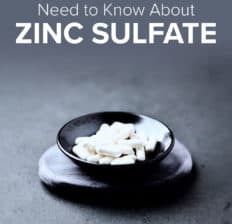This Dr. Axe content is medically reviewed or fact checked to ensure factually accurate information.
With strict editorial sourcing guidelines, we only link to academic research institutions, reputable media sites and, when research is available, medically peer-reviewed studies. Note that the numbers in parentheses (1, 2, etc.) are clickable links to these studies.
The information in our articles is NOT intended to replace a one-on-one relationship with a qualified health care professional and is not intended as medical advice.
This article is based on scientific evidence, written by experts and fact checked by our trained editorial staff. Note that the numbers in parentheses (1, 2, etc.) are clickable links to medically peer-reviewed studies.
Our team includes licensed nutritionists and dietitians, certified health education specialists, as well as certified strength and conditioning specialists, personal trainers and corrective exercise specialists. Our team aims to be not only thorough with its research, but also objective and unbiased.
The information in our articles is NOT intended to replace a one-on-one relationship with a qualified health care professional and is not intended as medical advice.
The Potential Benefits and Applications of Zinc Sulfate
May 27, 2023

Zinc is an essential mineral that should be consumed every day in order to maintain overall health and perform hundreds of important body functions. Behind iron, it’s the second-most-abundant mineral in the body, and without enough of it, we’d suffer from weakened immunity, digestive issues, thinning hair and more. To avoid a zinc deficiency, supplements such as zinc sulfate are available for human consumption, in addition to agricultural and industrial purposes.
What exactly is zinc sulfate, and is it safe?
What Is Zinc Sulfate?
Zinc sulfate is an inorganic compound that’s a combination of sulfur and zinc, with the chemical formula ZnSO4. Products containing zinc sulfate can be powdered, granular, pelleted or tableted.
The compound is highly soluble in water and used in various applications due to its versatility and properties. It’s colorless, odorless and available as crystalline powder.
In agriculture, zinc sulfate is often used as a fertilizer to supplement zinc in the soil. Zinc is an essential micronutrient for plants, and its deficiency can lead to stunted growth and reduced crop yields. Adding zinc sulfate to the soil can help prevent or correct zinc deficiencies, promoting healthier plant growth.
Zinc sulfate also has various industrial applications, such as its use in the production of dyes, pigments and paints, along with its use in preserving wood.
In the health care industry, zinc sulfate is used for several purposes. It’s a common ingredient in over-the-counter remedies for colds, as it is believed to help reduce the duration and severity of symptoms. It is also used to relieve diarrhea in children.
Benefits/Uses
1. Works As Soil Fertilizer
Zinc sulfate is commonly used as a fertilizer to supplement zinc in the soil. A zinc deficiency in soil can adversely affect plant growth and crop yield. Therefore, adding zinc sulfate to the soil helps address deficiencies and promotes healthier plant growth to improve crop productivity.
2. Kills Moss
Zinc sulfate is used for moss control, especially on roofs or buildings. The sulfates react negatively with organic materials, and when used in power form, it attacks the organic makeup of moss, shocking and killing it.
3. Reduces Cold Symptoms
Zinc helps to control inflammation and prevent elevated inflammatory responses that occur when the body is fighting an infection. For this reason, zinc sulfate is often included in over-the-counter cold remedies and dietary supplements due to its potential to reduce the severity and duration of cold symptoms.
Research published in the Cochrane Database of Systematic Reviews indicates that zinc sulfate is associated with a significant reduction in the duration of cold symptoms.
A study published in Pediatrics International that involved 120 children found that although zinc sulfate had no effect on the duration of cold symptoms, it was effective in reducing the severity of symptoms, especially nasal symptoms.
4. Relieves Diarrhea
Zinc sulfate is used medically to relieve diarrhea. The World Health Organization recommends 20 milligrams of zinc daily for 10–14 days for children with diarrhea.
A 2020 study published in the New England Journal of Medicine concluded that lower doses of zinc, five to 10 milligrams daily, were also effective for relieving diarrhea and associated with fewer side effects, such as vomiting.
5. Industrial Applications
Zinc sulfate has applications in various industrial sectors, including its use in the production of dyes, pigments and paints, serving as a white pigment in some formulations. For the manufacturing of a white pigment called lithopone, zinc sulfate is used in the production of paints, plastics and ceramics.
Zinc sulfate is also employed as a preservative for wood, protecting it from decay and insect damage.
6. Animal Feed Supplements
Zinc sulfate is used as an essential component in animal feed supplements. It ensures that livestock and poultry receive adequate zinc intake, which is crucial for their growth, development and overall health.
Zinc plays a role in various biological processes in animals, including immunity, reproduction and enzyme function. Research shows that zinc sulfate supplementation is effective in improving zinc deficiency in cattle and can help with issues related to milk production.
Dosage
The proper dosage of zinc sulfate can vary depending on the intended use and the individual’s age, health condition and specific requirements.
For general reference, here are some commonly recommended dosage ranges for zinc sulfate in certain applications:
- Nutritional Supplements: The recommended dietary allowance (RDA) for zinc varies depending on age and gender. For adults, the RDA ranges from eight to 11 milligrams per day for women and 11–12 milligrams per day for men. Pregnant and lactating women may require higher doses, usually around 11–13 milligrams per day. When consuming zinc sulfate, it’s critical to consult with a health care professional to determine the appropriate dosage based on your specific needs and circumstances.
- Cold Remedies: When used as a treatment for cold symptoms, zinc lozenges or oral supplements may be recommended. The dosage and frequency can vary, but typical dosages range from 15–30 milligrams of elemental zinc per day for adults. Of course, it’s important to follow the specific instructions provided by the product and not exceed the recommended dosage or duration of use.
- Diarrhea: Zinc sulfate is sometimes recommended for children with diarrhea. The World Health Organization recommends 20 milligrams daily for about two weeks, but studies indicate that lower doses of five to 10 milligrams are also effective.
- Agricultural Applications: The appropriate dosage of zinc sulfate as a fertilizer for agricultural use depends on various factors, including soil conditions, crop type and zinc deficiency levels. Specific recommendations can be obtained from agricultural experts or based on soil testing to determine the optimal dosage for addressing zinc deficiencies in a particular farming situation.
Risks, Side Effects and Interactions
Humans need zinc to maintain normal body functions, and while zinc sulfate is generally considered safe when used in appropriate amounts, it is important to be aware of potential risks, side effects and interactions.
Here are some of the key considerations:
- Side Effects: When taken in appropriate doses, zinc sulfate usually does not cause significant side effects. However, some individuals may experience gastrointestinal issues, such as nausea, vomiting, diarrhea or stomach cramps. These side effects are more likely to occur when high doses of zinc sulfate are consumed.
- Copper Deficiency: Long-term and excessive use of zinc supplements, including zinc sulfate, can interfere with copper absorption in the body and lead to copper deficiency. Copper is another essential mineral that plays a vital role in various bodily functions, so it’s important to maintain a balanced intake of zinc and copper, and consult a health care professional if you’re considering long-term or high-dose zinc supplementation.
- Interactions with Medications: Zinc sulfate may interact with certain medications, affecting their absorption and efficacy. For example, zinc supplements may reduce the absorption of antibiotics like tetracyclines and fluoroquinolones when taken simultaneously. Be sure to consult with a health care professional or pharmacist to check for potential interactions if you are taking any medications.
- Allergic Reactions: Some individuals may be allergic or hypersensitive to zinc sulfate or other zinc-containing compounds. Allergic reactions can vary in severity and may include rash, itching, swelling, dizziness or difficulty breathing. If you experience any signs of an allergic reaction after consuming zinc sulfate, seek immediate medical attention.
- Other Considerations: Pregnant or breastfeeding women, individuals with certain medical conditions (such as kidney disease), or those undergoing specific treatments should use caution and consult a health care professional before taking zinc sulfate supplements.
Conclusion
- Zinc sulfate is an inorganic compound that’s a combination of sulfur and zinc, with the chemical formula ZnSO4. It’s found in many forms, including as powder, pellets and tablets.
- Zinc sulfate is often used as a fertilizer to supplement zinc in the soil, and it has various industrial applications, such as its use in the production of dyes, pigments and paints, along with its use in preserving wood.
- In the health care industry, zinc sulfate is used in over-the-counter remedies for colds, as it is believed to help reduce the duration and severity of symptoms. It’s also used to relieve diarrhea in children.
- If you’re considering zinc sulfate consumption, speak to your health care provider for a recommended dose and duration of use. Excessive zinc sulfate intake may cause digestive side effects, such as stomach cramps, nausea and diarrhea.


